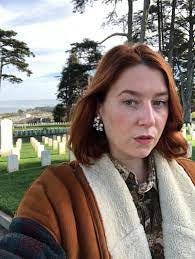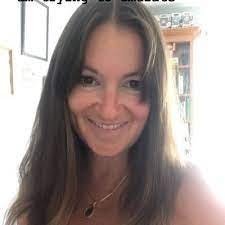The resting places of Sylvia Plath and Assia Wevill have historically been anything but. Plath’s grave, despite existing in a place of extraordinary natural beauty and rich cultural heritage, is a site of anguish, rage, and ongoing protest against Ted Hughes’s perceived ownership of her legacy. Wevill’s resting place has only recently come to light, and the very mystery of where her remains— and the remains of her daughter with Ted Hughes, Shura— are buried is part of an ongoing, confusing narrative of the ways her life and death have been erased from our cultural memory.
Since the first erection of Plath’s headstone in 1970, (and as recently as a few months ago) people have repeatedly defaced it by removing the word “Hughes,” by chisel, and other clever methods. There has been understandable outrage at this, even within the Plath community. But the question remains: Why is the rage about Sylvia Plath’s death and burial, and Ted Hughes’s role in both, as great as it ever was, given Plath died more than a half century ago? How does that anger connect to the world we inhabit, today?
And what is the relationship between Sylvia Plath’s and Assia Wevill’s deaths, and burials? How does that connection move well beyond the simplistic idea of a so-called “copycat” suicide? How do all of these things connect to the larger history of grave robbery and vandalization?
Please join my colleagues and friends Dr. Gail Crowther, Dr. Julie Goodspeed-Chadwick, Jessica Ferri, and myself to explore these issues and more in greater depth on Sunday March 6, 1:00 pm Eastern Time, in a Zoom panel discussion about the history and controversy of Sylvia Plath’s and Assia Wevill’s burials and grave sites, with time afterward for questions. This event is co-sponsored by Stockton University’s Literature Program. Registration is required; the link can be found here.
Dr. Gail Crowther is a freelance writer, researcher, and academic who specializes in the areas of Sylvia Plath studies, Anne Sexton, archives, the importance of place, and sociological hauntings. She received her PhD from the Sociology department at Lancaster University in 2010. She has published four books on Sylvia Plath, the latest with Simon & Schuster called Three-Martini Afternoons at the Ritz: The Rebellion of Sylvia Plath and Anne Sexton. Her other books are The Haunted Reader and Sylvia Plath and two co-authored books, A Year’s Turning: Sylvia Plath in Devon and These Ghostly Archives: The Unearthing of Sylvia Plath. She is currently working on her second book for Simon & Schuster, New York.
Julie Goodspeed-Chadwick, Ph.D., is an IUPUI Chancellor's Professor of English and affiliate faculty in Women's, Gender, and Sexuality Studies at Indiana University-Purdue University Columbus (IUPUC), where she also directs the Office of Student Research. Her research interests include modernist and contemporary writing by women, trauma studies, feminism, and identity politics. She is the author of Reclaiming Assia Wevill: Sylvia Plath, Ted Hughes, and the Literary Imagination (LSU Press, 2019) and Modernist Women Writers and War: Trauma and the Female Body in Djuna Barnes, H.D., and Gertrude Stein (LSU Press, 2011). With Peter K. Steinberg, she is the co-editor of The Collected Writings of Assia Wevill (LSU Press, 2021). She is currently working on a new book project in Sylvia Plath studies.
Jessica Ferri is a writer and photographer based in Northern California. Her work has been published in The Los Angeles Times, The Daily Beast, NPR, Yahoo!, The Economist, The Barnes and Noble Review, The New Yorker's Page Turner, Time Out New York, and more. She is the author of Silent Cities New York and Silent Cities San Francisco. She is currently at work on her first novel.
Emily Van Duyne is an Associate Professor of Writing at Stockton University in New Jersey, where she also lives with her husband and three children. A recent recipient of a New Jersey Individual Artist fellowship in prose writing from the Mid-Atlantic Arts Foundation, her book LOVING SYLVIA PLATH is forthcoming with W.W. Norton & Co. She is currently teaching and researching about Sylvia Plath at Aristotle University, in Thessaloniki, Greece, on a Fulbright Scholarship. Her essays and poems have appeared in American Poetry Review, Harvard Review, Literary Hub, Women's Studies Quarterly, and elsewhere. She has a cat called LeBron James who looks like Ted Hughes in his later years.









Will you rebroadcast if we can’t do Zoom? What a fascinating topic and group of experts.
Cool work you're doing Professor!